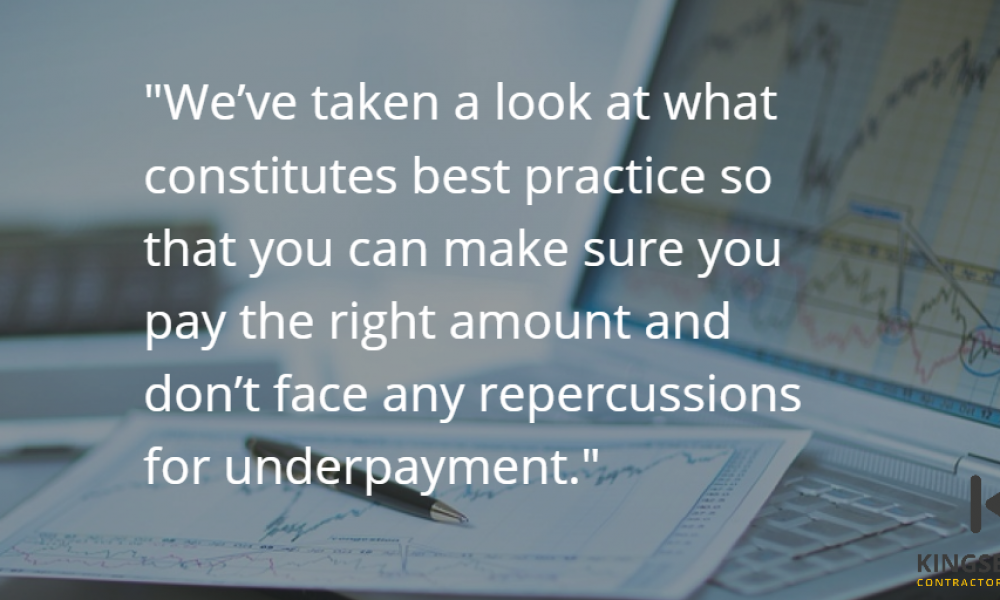5 most annoying things about being a recruiter
We all have bad days at work. Little annoyances that in the grand scheme of things, are minor – but…
Whether you set yourself up as a Limited Company or as a Sole Trader, looking after your financial records is…

Whether you set yourself up as a Limited Company or as a Sole Trader, looking after your financial records is vital to ensure you pay appropriate Income Tax, National Insurance, VAT, Corporation Tax, Student Loan Repayments or anything else that may be applicable to your situation.
We’ve taken a look at what constitutes best practice so that you can make sure you pay the right amount and don’t face any repercussions for underpayment.
Recent changes to Travel & Subsistence (T&S) legislation mean that you cannot claim tax relief on your commute to work if you work through an umbrella company. This has seen many contractors moving to operate as Personal Service Companies (PSCs or Limited Companies) as they can still claim T&S expenses. But what is the difference?
In short, the difference between a PSC and an umbrella company is that, with a PSC, you manage your own finances including tax and expenses but, with an umbrella company, you simply submit your timesheet and expenses and they pay you, working out your PAYE taxes for you.
Put simply, while an umbrella company is often easier (particularly if you’re only contracting short term), a PSC is more tax efficient.
This is not a legal requirement but appointing a reputable accounting firm can save you a lot of time and money further down the line. You will still need to keep your own books, but an accountant or accounting firm will be able to advise you of your HMRC obligations and, in the case of Limited Companies, what you can pay yourself and what needs to stay in the company.
In short, they will help make sure you stay on the right side of the law and don’t end up in a financial mess.
Doing the accounts is certainly no one’s idea of a good time so it can be tempting to put it off. The problem with this is that when you finally sit down to do it, you may have forgotten about individual payments and expenses, you may have lost receipts and you may end up making mistakes.
Take a little time – whether weekly, fortnightly or monthly – to log incomings and outgoings and file away invoices and receipts properly. The task will take much less time if you do it regularly and you will be secure in the knowledge that your books are accurate which, in turn, will make things much easier when handing them over to your accountant or completing your tax return.
It can be tempting to charge those after-work drinks to expenses under the guise of ‘entertaining’. Don’t do it. It’s not legal and it will get found out eventually. Expenses are there to help you with costs such as your commute, equipment for your company and even use of your home for time spent working there doing admin and accounts.
If you’re unsure of what does and doesn’t constitute an allowable expense, you can ask the advice of your accountant or read through the guidelines on the HMRC website.
It’s wise to keep a record of who you have invoiced and if/when they have paid you. This should be checked and updated regularly so you know if you have payments outstanding and if you need to chase up late payments. The last thing you want is to forget about an outstanding invoice, or go chasing a client who has, in fact, already paid.
If you’re operating as a Limited Company, make sure you keep a business bank account that’s separate to your personal bank account. All money should come and go through the business account and you should not consider it yours since it belongs to the business.
You will pay yourself a salary and dividends from this account and you should only consider it as your money when it arrives in your personal bank account. Your accountant will be able to advise what you can pay yourself so that you don’t end up in a situation where you’re having to pay money back to the business at the end of the tax year.
Similarly, if you choose to operate as a Sole Trader, it’s advisable to put money aside from your earnings to cover your personal deductions arising from your tax return.
If you are a contractor and would like to speak to someone about contractor insurance options, take a look at the Kingsbridge website or call our friendly team on 01242 808740 today.
You can also get in touch on Facebook, Twitter, and LinkedIn.